Categories
Latest Updates
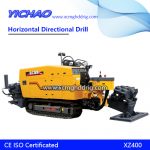
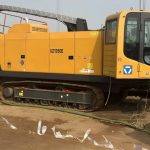
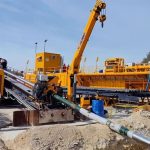
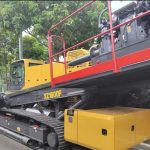
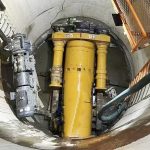
With the development of trenchless pipeline construction technology, the problem that large-scale slope excavation or support excavation cannot be carried out in the main urban area has been solved. This paper mainly studies the application cases of pipe jacking and directional drilling and hosting technology in hydraulic engineering in trenchless pipeline construction technology, and analyzes the cost of the two technologies, so as to provide a certain reference for the comparison and selection of engineering construction schemes.
Jinan Quanfu River and other river channel ecological water replenishment projects use the reclaimed water from the No. 1 Water Purification Plant, and use the reclaimed water of the No. Side ditch and Shanda Road side ditch for water supply. The main projects include pressure water pipelines, lifting pump stations, steel dam gates, stacked stone dams, river ecological landscape restoration, etc. According to the geological survey report, the pipeline laying area is filled with soil, miscellaneous fill, plain fill, silty clay, etc., and there is no rock layer distribution. The original design pressure pipeline of the project is pipe jacking construction. After multi-party argumentation and comparison, the directional drilling and hosting technology is used for construction.
For the construction of pipe jacking technology, it is necessary to set up the pipe jacking pit and the receiving pit first, and install the pipe jacking equipment in the pipe jacking pit. Utilize the thrust generated by the jacking equipment to squeeze the pipe into the soil in front, and then transport the jacked earth to the top of the pipe jacking pit through the vertical transportation equipment and then transport it away for storage. It mainly includes manual pipe jacking, extrusion jacking, water jet jacking, mud-water balance mechanical jacking, earth pressure balance mechanical jacking and other methods. At present, the pipe jacking technology is suitable for pipes with a diameter of 600-4000 mm, and the pipe materials can be reinforced concrete pipes, steel pipes, etc. The geological conditions are suitable for natural soil, plain soil, backfill soil, miscellaneous fill soil, soft rock, hard rock, etc. Construction sequence: caisson working well construction→pipe jacking equipment downhole→pipe jacking construction→earthwork transportation and storage→pipe jacking equipment removed after pipeline jacking construction→backfilling the working well.
The pipe jacking pit is constructed using caisson sinking technology. First, carry out foundation pit measurement and lofting, and locate the specific position of the working well according to the design ordinate; break the ground pavement, construct the edge cushion, and use graded sand layering to tamp the edge cushion; support the formwork and bracket in the shaft, sink When the well height exceeds 10.0 m, the well body concrete is poured in two sections. The formwork of the blade foot part adopts brick structure, and the width is the same as the width of the blade foot. form; after the completion of the formwork, the reinforcement shall be bound, and the oil on the surface of the reinforcement shall be cleaned, and the joints, lap joints, spacing, protective layer, etc. The hole is pre-blocked with brickwork.
Pour C30 concrete, remove and clean the formwork after the maintenance reaches the formwork removal standard; after the concrete strength reaches the design strength, the caisson will be excavated and sunk. The excavation tool is a crab bucket long-arm excavator. If the well body is tilted, correct the deviation in time if the problem is found; when the subsidence reaches close to the elevation, use the manual excavation crane to lift the soil, and take anti-sinking measures in advance to prevent over-sinking; Grouting on the outside. Use the same construction method to carry out sinking construction of the receiving well.
The jacking construction adopts the mud-water balanced jacking process. After the construction of the working well and the receiving well is completed, the pipe jacking materials and equipment will be prepared for entering the site. Firstly, guide rails are installed in the pipe jacking well according to the design elevation and slope, and the installation must be firm. The reinforced concrete caisson wall is used as the back wall of the pipe jacking equipment, and the pipe jacking equipment is hoisted by a 120 t crane, and various cables are lowered in sequence. After the installation of the pipe jacking equipment is completed, the jacking operation begins. An 18 t crane is used for the pipe lowering operation. After the front section of each pipe is jacked, the rear end interface is welded and assembled in the working well. The steel pipe welds must meet the requirements of relevant specifications. The jacking process is divided into several stages: initial jacking, normal jacking, and receiving jacking. In the initial jacking stage, it is necessary to collect and analyze various data, and adjust and correct the jacking attitude.
During pipeline construction, the ground and surrounding structures and buildings must be closely inspected to avoid settlement. When the pipe jacking is close to the pipe jacking receiving well, closely measure the relevant data and make preparations for entering the hole. Jacking into the hole is adopted, and no external force is used to break the hole door. After entering the hole, the brick slag is cleaned up in time, and the receiving track is laid. After the pipe jacking is completed, the hole is sealed. A 120 t crane is used to lift out the pipe jacking equipment . The pipe jacking well is located below the fast lane, and is backfilled with cement chips. After the backfill is completed, the hoisted prefabricated cover is blocked. After the plugging is completed, the road surface is restored and traffic is opened.
Pipe jacking technology cost analysis In accordance with the design bidding drawing scheme, the mud-water balance pipe jacking process is used to compile the construction bidding list, and the cost determined after the public bidding is analyzed. Finally, it is determined to build three pipe jacking work and three receiving wells, the diameter of the jacking pipe is DN800 mm, the material of the pipe is internal and external anti-corrosion spiral welded steel pipe, and the jacking length is 706.8 m. According to the cost analysis of the pipe jacking project, the cost of the pipe jacking well is 4.4677 million yuan, the cost of the receiving well is 1.2848 million yuan, and the pipe jacking cost is 1.9461 million yuan, totaling 7.6986 million yuan. After analysis, the cost index is about 10,892 yuan/extension meter, which does not take into account the cost of measures such as water reduction and temporary construction.
Directional drilling construction technology, capable of horizontal directional drilling with working pit and horizontal directional drilling without working pit, suitable for steel pipes, PE pipes, MPP pipes, etc. with a diameter of 100-1200 mm , The geological conditions are suitable for natural soil, plain soil, backfill soil, miscellaneous fill soil, soft rock, hard rock, etc. This article studies the technology of horizontal directional drilling with working pits. The construction sequence is: set up support piles and excavate the working pit→install the directional drilling machine→drill the hole→ream the hole→arrange the pipeline by backing up→remove the mechanical equipment→pull out Support pile → backfill the work pit.
After demonstration and analysis, 2 working wells and 2 receiving wells are set up. After calculating the earth pressure, it is determined to adopt the method of laying 12.0 m type IV steel sheet piles for support. Steel sheet pile support mainly has the advantages of fast construction speed, space saving, little impact on the surrounding environment, and simple process. Larsen steel sheet piles are used to support the working pit. First, positioning and setting out are required, and then the pile driver enters the site. The EX400 hydraulic pile driver is selected, and the single root driving method is adopted for construction. Before piling, each steel sheet pile should be oiled and inspected, and piles with defects must not be used. During the piling process, measure the inclination of the pile body at any time, and control it within the range required by the specification.
After the steel sheet pile support is completed, the working pit is excavated. After the excavation of the first layer of earthwork is completed, steel supports and steel purlins are installed to prevent the pile body from tilting. Excavate downward layer by layer and do a good job of drainage of the foundation pit. The depth of the working pit is determined according to the elevation of the drawing pipe, and a sump of a corresponding size is set in the working pit, and a mud pump is used to drain the foundation pit. After the excavation is completed, treat the soft soil at the bottom of the working pit. Due to the long length of the directional drilling backing, the required mechanical tension is relatively large, and the directional drilling machine needs to be fixed on the concrete foundation. The concrete foundation is poured with C20 concrete, 20 cm thick, with double-layer two-way [gf]3d5[/gf]12 steel bars inside.
First, design the drilling trajectory of the pilot hole, that is, design the optimal route of the pilot hole according to the pipeline design profile, and the distances of various existing pipelines should meet the requirements of relevant specifications. After the excavation of the foundation pit is completed and the concrete of the flat foundation reaches the design strength, a 120t crane is used to hoist the directional drilling rig into the pit. After the directional drilling equipment is installed in place, the pilot hole is drilled first, and the initial drilling height of the guide rod should be slightly higher than the design centerline of the pipeline. The positioning transmitter is installed in the pilot drill bit, and the sensor in the drill bit transmits signals to the ground receiver, and the receiver displays data such as its running depth, drilling angle, drill bit temperature, and the facing angle of the duckbill. After comparing the measured data with the established drilling design trajectory, the operator judges and adjusts the drilling route in time to ensure that the drilling route is consistent with the design trajectory.
According to the specification requirements, a scraper-type reamer with a diameter of 1200 mm is selected, which is 1.5 times the diameter of the designed pipe. In order to ensure the safe and smooth completion of the reaming, it is necessary to ensure that the retaining mud flows smoothly and fills the entire void. The mixing and pumping system of DDW-350 directional drilling rig is used for mud production, and the mud material is prepared by mixing bentonite, polymer and water. After the reaming is completed, the pipeline back-up construction is carried out. Steel pipes are prepared to ensure that the return pipe is formed and returned at one time, and a single 9.0 m long pipe needs to be welded in advance. Assemble the back-towing support, and the back-to-back support is laid with sand bags, and one sand bag is placed at an interval of 20.0 m. After pulling back the pipe, in order to prevent ground subsidence, cement slurry should be used in the directional drilling gap to reinforce the hole.
The grouting pipe is made of two steel flower pipes with a diameter of 25 mm, which are pulled into the soil at the same time as the main pipe. After finishing backing the cloth pipe, the directional drilling rig moved to the final working pit, backed the grouting pipe in the reverse direction, grouted while backing it, and injected 1:1 cement pulverized coal with a high-pressure grouting machine every time it was pulled back for 6.0 m. Mortar until the slurry completely fills the steel pipe gap. During the grouting process, uninterrupted grouting should be maintained until it is completed to prevent the grout from flowing out. When gaps appear, supplementary grouting should be carried out in time for reinforcement. After the grouting and directional drilling are completed, the drilling rig is hoisted out, the Larsen steel sheet piles are pulled out, and the working pit is backfilled.
According to the proven implementation plan, two directional drilling working pits and two directional drilling receiving pits are set up. The diameter of the directional drilling pipe is DN800 mm. The pipe material is internal and external anti-corrosion spiral welded steel pipes. Carry out cost analysis for the directional drilling underpinning process. Since there is no unit price in the contract list for directional drilling, the “Shandong Province Municipal Engineering Consumption Quota” SDA 1-31-2016 shall be applied in accordance with the contract. According to regulations, the cost of steel pipes and pipes shall be based on the original contract unit price. Therefore, the cost of the pipe jacking well is 460,200 yuan, the cost of the receiving well is 318,600 yuan, and the pipe jacking cost is 2,372,800 yuan, totaling 3,151,600 yuan. After analysis, the cost index is about 4,458 yuan/extension meter, which does not take into account the cost of measures such as drainage and temporary construction.
Through the study of the application of pipe jacking and directional drilling and hosting technology in actual engineering, it is found through technical comparison and analysis that, under the condition of geological conditions, the two construction technologies can solve the problem that water conservancy pipeline projects cannot be opened in a large area during construction in the main urban area. The problem of excavation can greatly reduce the impact on existing buildings, roads, strata, and traffic guidance organizations during the construction process. However, through cost comparison analysis, the pipe jacking construction technology is more expensive than the directional drilling and hosting technology. The main reason is that the construction of pipe jacking working wells is difficult, and the market price of pipe jacking machinery and equipment and labor services is high. With the rapid development of directional drilling and hosting technology, large-diameter pipeline construction can already be carried out, and it has the characteristics of long single construction length, low market price, and fast construction speed, which plays an important role in reducing project cost, saving investment, and shortening construction period. important role.
